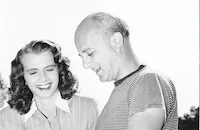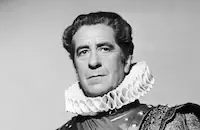Deerslayer
Cast & Crew
Lew Landers
Bruce Kellogg
Jean Parker
Larry Parks
Warren Ashe
Wanda Mckay
Film Details
Technical Specs

Synopsis
In the late 1700s, Huron chief Rivenoak leads his warriors in raids against white settlers and their allies, the Mohican and Delaware tribes, after many years of peace. Among those on the defense are Deerslayer, a white man reared by the Mohican chief Uncas, and Uncas' own son, Jingo-Good. The Hurons are aided by Briarthorn, a traitorous Mohican who is in love with the Delaware princess Wah-Tah, the betrothed of Jingo-Good. After Briarthorn kills Chief Brave Eagle, Wah-Tah's father, and kidnaps Wah-Tah, Jingo-Good vows revenge. Meanwhile, Deerslayer comes to the rescue of Hetty Hutter and her little brother Bobby, who are being attacked by Huron warriors. Deerslayer helps them reach the "Arc," a houseboat used as a ferry by their father. Bobby is in desperate need of a doctor, however, so Deerslayer goes to the stockade, where the settlers agree to provide a doctor and an escort if Deerslayer does them a service in return. Deerslayer acquiesces and is sent in search of his old friend, Harry March, who is escorting sixty-five eastern women to the stockade, where they are to be wed to the frontiersmen. Deerslayer finds Harry as he is crossing the rapids of a dangerous river in an attempt to avoid going the long way around. After signaling to the women to wait on the other side, where they will be safe from the Hurons, Deerslayer and Harry go to the Arc to help defend the Hutters. They also vie for the affections of Hetty's older sister Judith, but she maintains a friendly distance from the men. Jingo-Good's thirst for revenge is increased when Chief Uncas is killed, and the Hurons further anger Deerslayer when they capture Hutter and Harry. Hetty, who knows that the Hurons will not harm a mentally unbalanced person, pretends to be insane and gains access to the Huron camp, where she obtains Hutter and Harry's release by offering a valuable ransom. Deerslayer and Jingo-Good then attempt to rescue Wah-Tah, and although the two Indians escape, Deerslayer is captured. He is not held prisoner for long, however, as Jingo-Good soon rescues him. The Hurons, enraged over their interference, attack the Hutters' lake home, and Hutter and Hetty are killed in the battle. A contingent of settlers from the stockade arrive in time to subdue the uprising and save Deerslayer, Jingo-Good and the others. Later, after Judith admits that she loves Harry, Deerslayer returns to the river to escort the women to their waiting grooms.

Director

Lew Landers
Cast
Bruce Kellogg

Jean Parker

Larry Parks
Warren Ashe

Wanda Mckay

Yvonne De Carlo

Addison Richards
Johnny Michaels
Phil Van Zandt
Trevor Bardette

Robert Warwick
Many Treaties
Clancy Cooper
Princess Whynemah
William Edmunds
Charles Brunner
Steve Clark
Crew
E. B. Derr
E. B. Derr
P. S. Harrison
P. S. Harrison
William Kiernan
William Knight
John W. Krafft
Arthur Martinelli
George Mcguire
Fred Stahl
Eddie Stein

Film Details
Technical Specs

Quotes
Trivia
Notes
According to Hollywood Reporter news items, this film was shot on location at Lake Elsinore, CA, and actor Johnny Michaels was borrowed from Paramount for the production. Deerslayer was the only picture written and produced by P. S. Harrison, a longtime film critic and the publisher of Harrison's Reports [Harrrison's Reports]. The Harrrison's Reports review, which was written by Harrison's friend Abram F. Myers, noted that the producers were considering a "series of pictures based on the writings of James Fenimore Cooper." Hollywood Reporter news items also noted that Harrison and Derr were working on a screenplay for The Last of the Mohicans, in which they intended to star Bruce Kellogg and Warren Ashe. Deerslayer was not well received, however, and the Daily Variety reviewer termed it "a museum piece that should be kept handy to show to any film critics who might hanker to turn producers in the future." Derr and Harrison did not produce any more pictures together. Other films based on Cooper's novel include Twentieth Century-Fox's 1957 release, The Deerslayer, which was directed by Kurt Neumann and starred Lex Barker, Rita Moreno and Forrest Tucker, and a 1978 television movie directed by Dick Friedenberg and starring Steve Forrest and Ned Romero.












